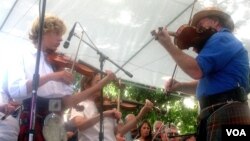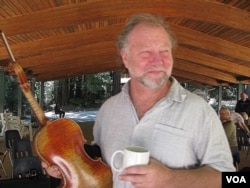SANTA CRUZ, CALIFORNIA —
Many people associate Scottish music with one instrument: bagpipes. But Scotland's folk tradition is so much richer and fiddler Alasdair Fraser hopes to bring that musical message to the world.
The California-based performer and composer runs popular Scottish fiddling camps to encourage young and old to take up the instrument.
The Valley of the Moon Scottish fiddle camp is nestled amidst towering redwood trees in the Santa Cruz mountains. In that bucolic setting, more than 200 students spend a week camping, swimming, hiking and playing their fiddles day and night.
Express yourself
Fraser started the music camp 29 years ago, shortly after he moved to the San Francisco Bay Area from his native Scotland.
His desire to share his music grew out of childhood memories from the 1950s and 60s, when traditional music was suppressed in Scottland's schools and universities. Fraser felt pressured to conform to British culture. People were afraid to speak with a Scottish accent.
"That hurt me to realize that, because what I want is justice, for the human soul to be allowed to flourish and for people to be able to express themselves," he says. "And so shy, introverted little me, with a fiddle in my hand,I feel compelled to ask questions that I wouldn't normally…saying 'Why are we not playing these tunes?'"
Shared passion
In the 1980s, Fraser found only a handful of people who knew Scottish fiddling, with its distinctive driving, syncopated rhythms, double-stops and use of staccato. He hoped Valley of the Moon would introduce Americans to Scottish music and get them to share his passion.
"The idea is to release the personal voice we have within us and to enable people to find fluency in their own expression, their own soul," he says. "You can create an environment where people feel safe to try, to open up and to know that they're valued. And once people begin to realize that, they'll begin to speak."
Mariel van der Steel found her voice when she attended Valley of the Moon for the first time in 2000, at age 14. She’d been playing classical violin since she was a child, but found it too restrictive and was on the verge of quitting.
"My mom happened to see a San Francisco Scottish fiddlers-Alasdair Fraser poster for a concert near my house at the grocery store and she thought 'Maybe I'll bring Mariel to that," Mariel says. "She did and it was a magical experience and I just saw all these musicians, these fiddle players on stage playing music all together with huge smiles on their faces and that's what made me know I needed to come to Valley of the Moon, so I signed up for San Francisco Scottish fiddlers after the show."
'Educating the ear'
Valley of the Moon offers workshops and classes for fiddle, cello, percussion, guitar, and keyboards. The instructors teach students to play by ear, the traditional way that the old tunes were learned and passed on centuries ago in Scotland. Written music and tune books are not allowed at the camp. Fraser says the goal is to educate the ear.
The Valley of the Moon is so popular that its once-a-year summer camp now fills up quickly. To meet demand, Fraser opened a second California fiddle camp in the Sierra Nevada Mountains, a four-hour drive east of San Francisco. He's also started camps in Scotland's Isle of Skye and most recently at the Crisol de Cuerda - the Crucible of Strings - in the Valle de Tena in northern Spain.
The camps are open to musicians of all ages and abilities. The idea, he says, is to create a supportive and inclusive environment.
"I love hearing someone who is really good at what they do. But I also like saying to someone who is very good at what they do 'hey, could you take a minute and help that little girl who's having trouble with her bow arm right now?' And people want to do that-they want to share what they've learned. I think everyone just relaxes when they know the competitive edge is not there and really it's just family taking care of each other."
The ‘family’ wraps up the week-long camp with a concert at the Santa Cruz Civic auditorium, featuring all 232 fiddlers and musicians performing on stage, helping Alasdair Fraser keep traditional Scottish music alive and well in the 21st century.
The California-based performer and composer runs popular Scottish fiddling camps to encourage young and old to take up the instrument.
The Valley of the Moon Scottish fiddle camp is nestled amidst towering redwood trees in the Santa Cruz mountains. In that bucolic setting, more than 200 students spend a week camping, swimming, hiking and playing their fiddles day and night.
Express yourself
Fraser started the music camp 29 years ago, shortly after he moved to the San Francisco Bay Area from his native Scotland.
His desire to share his music grew out of childhood memories from the 1950s and 60s, when traditional music was suppressed in Scottland's schools and universities. Fraser felt pressured to conform to British culture. People were afraid to speak with a Scottish accent.
"That hurt me to realize that, because what I want is justice, for the human soul to be allowed to flourish and for people to be able to express themselves," he says. "And so shy, introverted little me, with a fiddle in my hand,I feel compelled to ask questions that I wouldn't normally…saying 'Why are we not playing these tunes?'"
Shared passion
In the 1980s, Fraser found only a handful of people who knew Scottish fiddling, with its distinctive driving, syncopated rhythms, double-stops and use of staccato. He hoped Valley of the Moon would introduce Americans to Scottish music and get them to share his passion.
"The idea is to release the personal voice we have within us and to enable people to find fluency in their own expression, their own soul," he says. "You can create an environment where people feel safe to try, to open up and to know that they're valued. And once people begin to realize that, they'll begin to speak."
Mariel van der Steel found her voice when she attended Valley of the Moon for the first time in 2000, at age 14. She’d been playing classical violin since she was a child, but found it too restrictive and was on the verge of quitting.
"My mom happened to see a San Francisco Scottish fiddlers-Alasdair Fraser poster for a concert near my house at the grocery store and she thought 'Maybe I'll bring Mariel to that," Mariel says. "She did and it was a magical experience and I just saw all these musicians, these fiddle players on stage playing music all together with huge smiles on their faces and that's what made me know I needed to come to Valley of the Moon, so I signed up for San Francisco Scottish fiddlers after the show."
'Educating the ear'
Valley of the Moon offers workshops and classes for fiddle, cello, percussion, guitar, and keyboards. The instructors teach students to play by ear, the traditional way that the old tunes were learned and passed on centuries ago in Scotland. Written music and tune books are not allowed at the camp. Fraser says the goal is to educate the ear.
The Valley of the Moon is so popular that its once-a-year summer camp now fills up quickly. To meet demand, Fraser opened a second California fiddle camp in the Sierra Nevada Mountains, a four-hour drive east of San Francisco. He's also started camps in Scotland's Isle of Skye and most recently at the Crisol de Cuerda - the Crucible of Strings - in the Valle de Tena in northern Spain.
The camps are open to musicians of all ages and abilities. The idea, he says, is to create a supportive and inclusive environment.
"I love hearing someone who is really good at what they do. But I also like saying to someone who is very good at what they do 'hey, could you take a minute and help that little girl who's having trouble with her bow arm right now?' And people want to do that-they want to share what they've learned. I think everyone just relaxes when they know the competitive edge is not there and really it's just family taking care of each other."
The ‘family’ wraps up the week-long camp with a concert at the Santa Cruz Civic auditorium, featuring all 232 fiddlers and musicians performing on stage, helping Alasdair Fraser keep traditional Scottish music alive and well in the 21st century.





